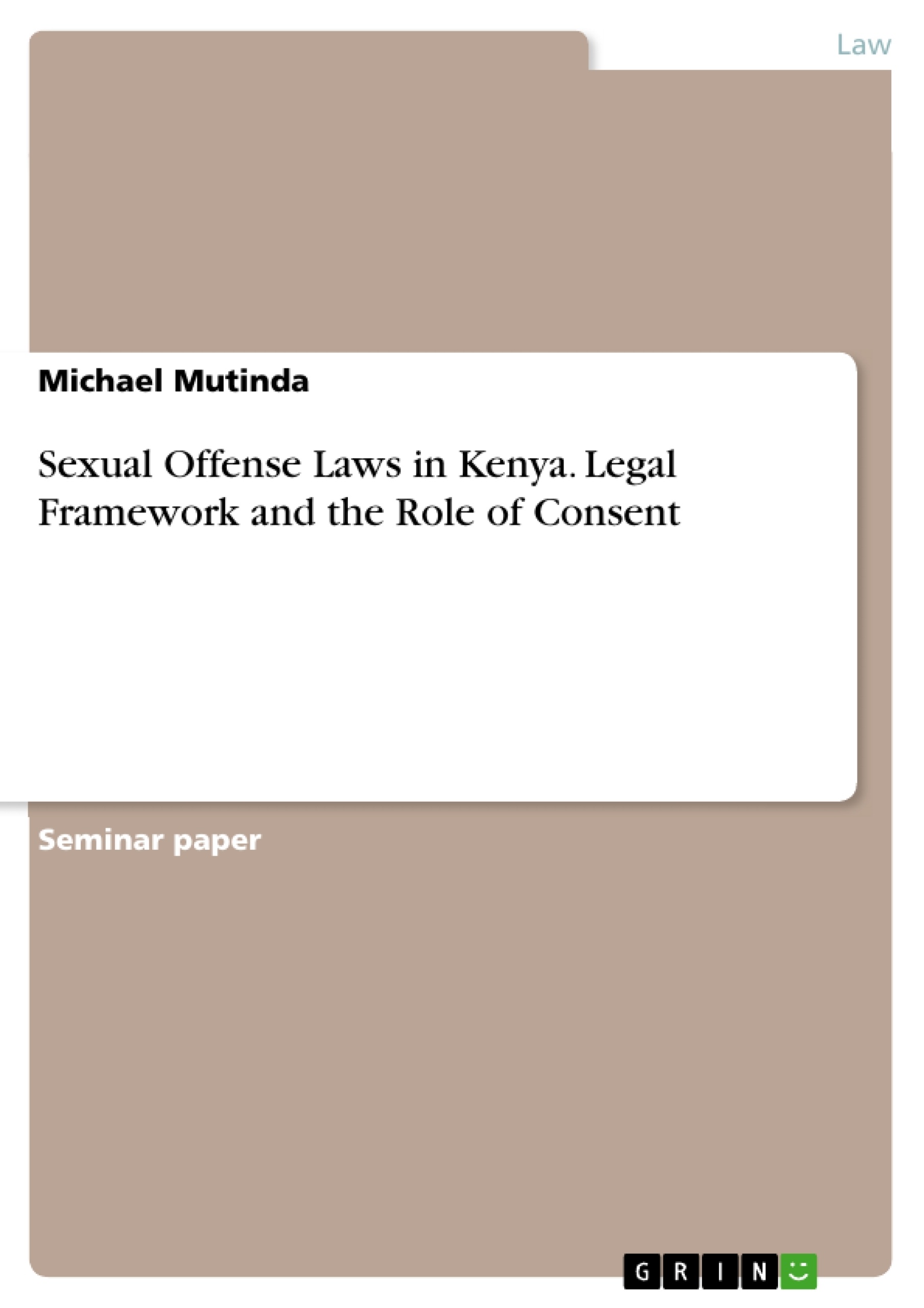This research examines the legal framework for governing sexual consent and accessing whether it has been successful or not. This research will also propose reforms on the legal framework governing sexual consent for the strengthening of laws on sexual offenses in Kenya.
Sexual offenses remain a major challenge that Kenya is facing today. Sexual offenses have adverse effects of derailing not only ones legal, social and economic development but also that of the country as a whole. There is a high prevalence of gender‐based violence in Kenya. Sexual violence takes many forms, including rape, sexual assault, defilement, incest, and many others. This type of violence is a reflection of gender inequality in a society where mostly men exercise power over women and girls. The Sexual Offenses Act, 2006 was passed in order to deal with the problem of sexual violence since sexual offenses were previously governed by the Penal Code.
Inhaltsverzeichnis (Table of Contents)
- LIST OF CASES
- INTRODUCTION
- LEGAL FRAMEWORK GOVERNING SEXUAL CONSENT IN KENYA
- The Sexual Offences Act
- Definition of Consent in the Sexual Offences Act
- International Instruments
- THE ROLE OF CONSENT IN SEXUAL OFFENCES CASES
- The Offence of Defilement
- The Role of Consent in Defilement Cases
- The Offence of Rape
- The Role of Consent in Rape Cases
- The Offence of Incest
- The Role of Consent in Incest Cases
- The Offence of Sexual Assault
- The Role of Consent in Sexual Assault Cases
- COMPARATIVE STUDY ON EMERGING ISSUES ON CONSENT IN SEXUAL OFFENCES CASES
- Issues arising on consent in sexual offences cases
- When can one withdraw consent?
- Proof of withdrawn consent
- Marital Rape
- Consent in Defilement cases
- Defilement case involving a Minor and an Adult
- Defilement case involving a Minor and a Minor
- CONCLUSION AND RECOMMENDATIONS
- Conclusion
- Recommendations
- BIBLIOGRAPHY
Zielsetzung und Themenschwerpunkte (Objectives and Key Themes)
This research aims to examine the legal framework governing sexual consent in Kenya, evaluating its effectiveness in addressing sexual offences. The research also proposes reforms to strengthen the legal framework and ensure robust protection against such crimes.
- The legal framework governing sexual consent in Kenya
- The role of consent in various sexual offences, including defilement, rape, incest, and sexual assault
- Emerging issues concerning consent in sexual offences cases, such as withdrawal of consent and consent in defilement cases involving minors
- Recommendations for strengthening the legal framework governing sexual consent
Zusammenfassung der Kapitel (Chapter Summaries)
- Introduction: This chapter sets the context by highlighting the prevalence of sexual offences in Kenya and the adverse effects of gender-based violence. It introduces the Sexual Offences Act, 2006, and emphasizes the crucial role of consent in determining guilt in sexual offences cases.
- Legal Framework Governing Sexual Consent in Kenya: This chapter delves into the legal framework governing sexual consent in Kenya, focusing primarily on the Sexual Offences Act, 2006. It explores the statutory definition of consent, the test of reasonable belief in consent, and evidential and conclusive presumptions about consent.
- The Role of Consent in Sexual Offences Cases: This chapter examines the role of consent in various sexual offences, including defilement, rape, incest, and sexual assault. It analyzes how consent is defined and applied in these specific contexts.
- Comparative Study on Emerging Issues on Consent in Sexual Offences Cases: This chapter explores emerging issues concerning consent in sexual offences cases, such as the withdrawal of consent, proof of withdrawn consent, marital rape, and consent in defilement cases involving minors. It analyzes legal precedents and challenges in these areas.
Schlüsselwörter (Keywords)
This research focuses on the legal framework governing sexual consent, the role of consent in sexual offences, emerging issues related to consent, and recommendations for strengthening the legal framework. Key terms include: sexual offences, consent, defilement, rape, incest, sexual assault, withdrawal of consent, marital rape, defilement of minors, Sexual Offences Act, legal framework, reforms.
- Citar trabajo
- Michael Mutinda (Autor), 2018, Sexual Offense Laws in Kenya. Legal Framework and the Role of Consent, Múnich, GRIN Verlag, https://www.grin.com/document/594615



